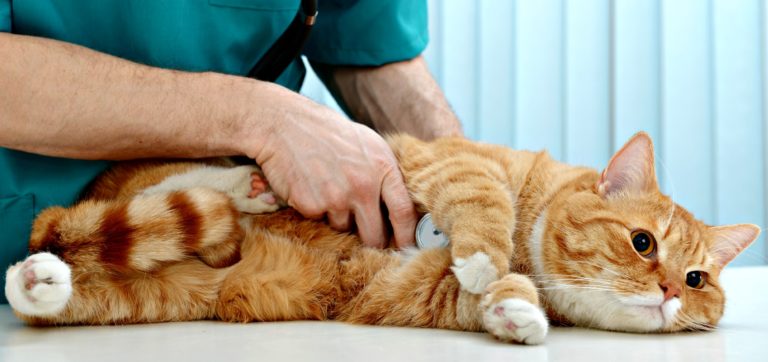When Daniel Dockery of Phoenix, Arizona found a stray four-day-old kitten, he took her into his care, named her “Scruffy,” and fed her by hand until she opened her eyes for the first time. As Scruffy matured, Dockery decided that the most responsible thing he could do was have her spayed.
A recovering addict, Dockery didn’t readily have the funds to pay for the procedure. In the interest of doing what was best for the cat, he raised the money from family and friends so Scruffy could be spayed. Caring for Scruffy, says Dockery, helped him to maintain his sobriety and provided him with therapeutic companionship. When at 9 months old Scruffy was badly cut by a barbed wire fence, Dockery immediately took her to be treated at the one place he felt sure would help her: The low cost veterinary clinic at the Arizona Humane Society’s Campus for Compassion.
After Scruffy was medically evaluated and deemed to be treatable, Dockery was given a treatment estimate of $400. Once again he found himself facing a financial challenge related to Scruffy’s care. Having successfully raised funds for her spaying, Dockery again turned to others for help. The first person he contacted was his mother, in Michigan. She agreed to provide the clinic with her credit card information by phone. Unfortunately, this was against the clinic’s financial policy. Dockery’s mother agreed to wire the funds instead, but it would take 24 hours for the cash to be available.
Scruffy needed immediate attention, but the promise of money being wired within 24 hours was not enough for the clinic to treat the cat. Clinic staff told Dockery that his only other option was to sign ownership of the kitten over to them, so she could be properly treated and then placed in foster care. Only wanting to help the cat, Dockery signed the papers for her surrender.
Scruffy was euthanized only hours later. Dockery was devastated. He felt he had failed the kitten.
The Humane Society’s clinic claimed that, among other things, the lack of immediate payment was a factor in the decision to euthanize the cat. They also cited a shortage of  veterinary staff.
veterinary staff.
When Dockery’s story was published in the Arizona Republic, it was met with outrage. The Humane Society was inundated with negative phone calls and Facebook comments, as well as threats to pull donations. In the wake of this response, the Humane Society’s veterinary clinic amended their financial policy. They now accept credit card payments by phone, and have earmarked a portion of donations to establish a relief fund — specifically for pet owners who need an extra day or two to come up with money.
The Humane Society’s Executive Director at the time, Guy Collison, noted that, while Scruffy’s story is “heartbreaking…[it] underscores the worst-case-scenario of need eclipsing resources available.”
Unfortunately, many Americans are in the same boat as Daniel Dockery when it comes to paying a costly, unexpected vet bill. Unlike Dockery, it isn’t their mother who is necessarily sending them money; instead they may be awaiting a paycheck to be able to afford treatment for their animal. With 76% of Americans living paycheck to paycheck, household income down as much as 8%, and savings decreasing as debt rises, a growing number of veterinary practices are being challenged to address the cost barrier to care.
Injuries like Scruffy’s can usually be successfully treated – as long as the pet owner can pay for veterinary care. A 91% increase in veterinary costs between 2000 – 2013 means that paying for pet health care has become more challenging by the year. Pet owners who don’t have the means to pay in full up front — and their numbers are increasing — are forced to limit treatment to the bare minimum. In the worst case, they have no choice but to forgo treatment entirely, and must then make the most painful decision of all: to euthanize or surrender their pet.
Whatever undesirable option they choose, they will still be going home to a house with one less family member.
Sources:
- “Daniel Dockery, Arizona Cat Owner, Loses Pet After Humane Society Euthanizes It.” Huffingtonpost.com. N.p., 28 Dec. 2011. Web. 23 Feb. 2015.
- “Phoenix man learns cat was euthanized over money.” Arizona Republic. http://archive.azcentral.com/arizonarepublic/local/articles/20111227phoenix-scruffy-cat-euthanized.html
- “Recovering Addict’s Therapy Kitten Euthanized.” Care2. http://www.care2.com/causes/recovering-addicts-therapy-kitten-euthanized.html 28 c 2011
- “Veterinary Private Practice Sector Makes Modest Rebound.” http://news.vin.com/VINNews.aspx?articleId=32051
- “76% of Americans are living paycheck to paycheck.” CNN Money (New York). http://money.cnn.com/2013/06/24/pf/emergency-savings/ 24 June 2013
- “Income and Poverty in the United States: 2013.” U.S. Census Bureau. http://www.census.gov/content/dam/Census/library/publications/2014/demo/p60-249.pdf Issued Sept. 2014
